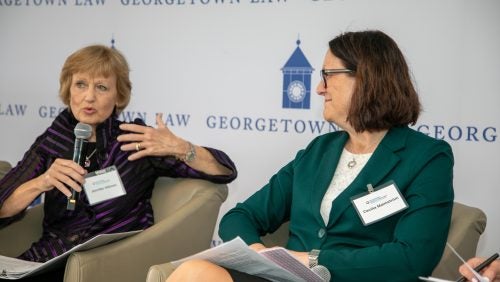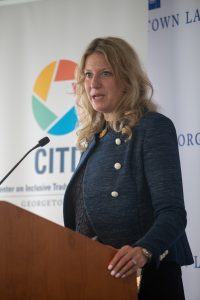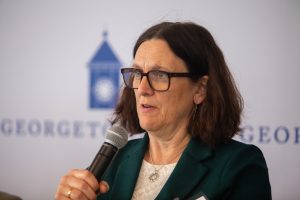Practitioners, Policymakers Gather to ‘Rethink’ World Trade
May 2, 2025

CITD Co-Founder Professor Jennifer Hillman (left) and former European Commissioner for Trade Cecilia Malmström (right)
Academics, legal experts and policymakers gathered at Georgetown Law on April 15 for the third annual “Rethinking World Trade” conference hosted by Georgetown Law’s Center on Inclusive Trade and Development (CITD), which develops inclusive, sustainable solutions to international trade challenges through collaboration among students, scholars and advocates.

CITD Co-Founder and Faculty Director Professor Katrin Kuhlmann
“We are at a turning point in international trade law and possibly international law more broadly,” said CITD Co-Founder and Faculty Director Professor Katrin Kuhlmann in her opening remarks. “We need to channel whatever creativity and positivity we have towards these issues at the highest levels of international law and at the most local levels as well.”
During panels such as “Weaponizing Trade: Economic Patriotism or Protectionism?” and “Trade Policy Pivot: From Inclusion to Isolation,” speakers and attendees engaged on a range of emergent trade-related issues, including recent United States tariff policy, sustainability concerns and the link between economic development and national security.
Fostering cooperation through trade
The conference opened with a conversation between Hillman, Kuhlmann and former European Commissioner for Trade Cecilia Malmström, nonresident senior fellow at the Peterson Institute for International Economics, who discussed the relationship between the U.S. and its trading partners in light of the presidential administration’s recent tariff policies and other trade-related directives.
“Trade with others is something that we think is not only good for business, but it’s also good because it unites people,” Malmström said. “It creates good side effects [and] cooperation in a lot of other areas.”

Former European Commissioner for Trade Cecilia Malmström
Malmström noted that the current U.S. presidential administration is not alone in its pushback against globalization. “Some of the largest players seem to be rejecting at least some of the basic concepts and rules that have been underpinning [the post-World War II global trade system],” she said.
Malmström also underscored the impact of issues such as geopolitical conflict, including the ongoing Russia-Ukraine war, and environmental initiatives like decarbonization on global trade and related policy.
“The climate crisis has not gone away,” she said. “Even if the headlines are about tariffs.”
“I want to offer special thanks to our panelists, who shared valuable insights about current global trade policy, its context and its implications,” said CITD Co-Founder Professor Jennifer Hillman following the event. “At a time when challenges to the system of international trade are top of mind for academics and policymakers alike, this forum reminds us of the value of collaboration and open conversation when it comes to advancing truly inclusive, sustainable trade rules for all.”